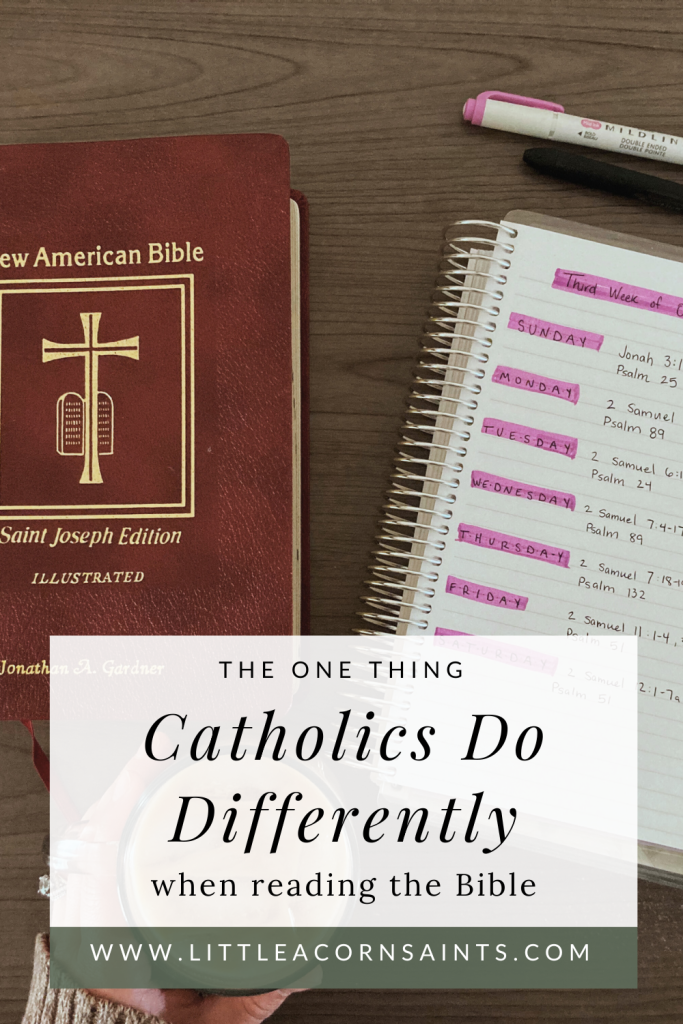Sacred Scripture
There’s one thing Catholics do differently than all other Christians when we read the Bible.
Have you ever been asked “Do Catholics read the Bible”? This question might seem obvious (and offensive) to many Catholics, but it is a popular misconception in the Protestant community. In this post I discuss how Catholics reject the theological doctrine of sola scriptura, and instead look at both Sacred Scripture and Sacred Traditions as the foundations of our beliefs.

There’s one thing Catholics do differently than all other Christians when we read the Bible.
We don’t believe in sola scriptura.*
*The Theological Doctrine of “by scripture alone”.
However, this does not mean that we, as Catholics, reject the teachings in the Bible. As a matter of fact, we highly venerate the Bible and believe that it holds a strong power over the soul. Additionally, we believe that reading the Bible is so important that it should be done on a daily basis. Catholics read passages from the old and new testaments and the gospel at every Mass and any of our favorite prayers are based on Sacred Scripture.
The Dei Verbum* has this to say about Sacred Scripture:
In Sacred Scripture, the Church constantly finds her nourishment and her strength, for she welcomes it not as a human word, “but as what it really is, the word of God.”
We recognize that the Sacred Scripture is the Word of God, whose authors were inspired by the Holy Spirit.
And the Catechism states:
The inspired books teach the truth.
Where does this misconception come from?
So why is there this misconception among the protestant communities that Catholics don’t read the Bible?
I am a Catholic Convert who grew up in a majority protestant community. Because of this, I have a general understanding of what most protestants believe and how they tend to view Catholics. I feel comfortable saying that their belief that Catholics don’t read the bible stems from the additional rules, traditions, and customs that Catholics observe in addition to what is offered as guidance in the Bible.
So what do Catholics actually believe – and where does it come from?
So if Catholics don’t rely on Scripture alone, what do we believe? Well, we also consider Sacred Traditions (that are passed down from the apostles) to also be the Word of God.
As Catholics, we are called to read Sacred Scripture with a discerning heart and to “be attentive to what the human authors truly wanted to affirm and to what God wanted to reveal to us by their words.“
Lastly, we are cautioned to “Read the Scripture within the living Tradition of the whole Church.” And to seek interpretation of Scripture through the Holy Spirit and with the guidance of our leaders in the Church.
The Catechism of the Catholic church is a document that summarizes the Catholic Church’s doctrine. Simply put – the Catechism states what we believe and why we believe it.
You can read the Catechism of the Catholic Church on the Vatican’s website here.
A document referenced in the Catechism is the Dei Verbum. The Dei Verbum was released by the Second Vatican council on November 18, 1967. It serves as the Dogmatic Constitution on Divine Revelation.
You can read the Dei Verbum for free at the Vatican’s website here.
There are three overall themes in the Dei Verbum:
- the view of the phenomenon of tradition
- the theological problem of the application of critical historical methods to the interpretation of Scripture
- the Biblical movement that vegan in the 1900s
Both the Dei Verbum and the Catechism discuss in depth the importance of Sacred scripture via the Holy Bible.
Both documents serve as a foundation for our faith and beliefs. They both caution the faithful to take Sacred Scripture into the context it was written and to be wary of interpretations that do not reflect the true meaning of the text.
Lastly, there is no official interpretation of the Holy Bible that is approved by the Church. Both documents support the position that the Church encourages Sacred Scripture to be read for personal reflection with aid of the Holy Spirit.
Recommendations for additional Readings
I highly recommend that every Catholic should have a print copy of the Catechism in their home. Having a personal copy is great for easy reference and to help with spiritual growth. My personal copy of the Catechism is the pocket edition from Ignatius press.
Another print copy of the catechism that I love is the Catechism of the Council of Trent from TAN Books.
The Catechism of the Council of Trent
Description from the TAN Books website:
The Catechism of the Council of Trent, compiled under the supervision of St. Charles Borromeo and approved by Pope St. Pius V, has been recognized as the most authoritative catechism by many of the greatest popes, such as St. Pius X, Clement XIII, Benedict XV, Leo XIII, and many others. It has been used by clergy and laymen for over 400 years as a source of the clear and simple truths of the Faith.
Use code ACORNS15 at TAN books for a 15% discount!
The Catechism can be difficult at time to try and interpret, especially in the context of modern day issues. Here are some additional titles from Ignatius Press and TAN Books that offer guidance on interpreting and understanding the Catechism.
TAN Books
- The Catechism Explained by Fr. Francis Spirago
- We Believe: A Simple Commentary on the Catechism of Christian Doctrine by Msgr. A.N. Gibley
Ignatius Press
- Introduction to the Catechism of the Catholic Church by Cardinal Christoph Schoenborn & Cardinal Joseph Ratzinger
- The Companion to the Catechism of The Catholic Church (A Compendium of Texts)
- Catechism of the Catholic Church – Second Edition


